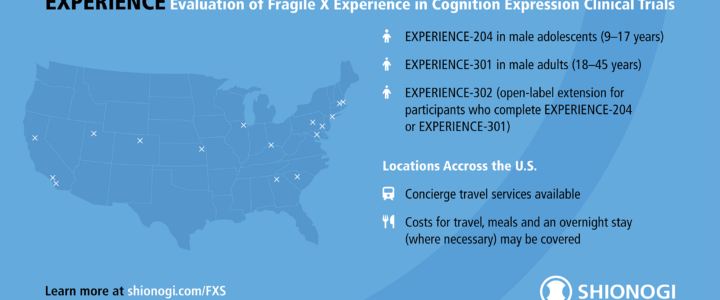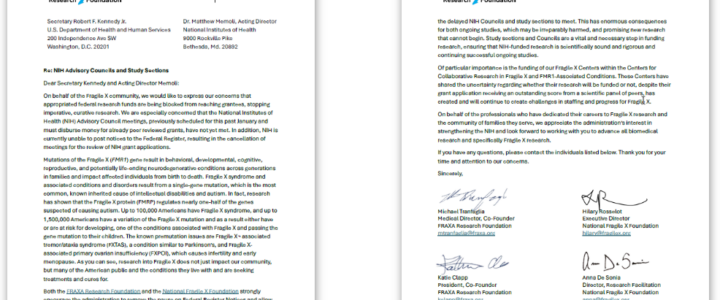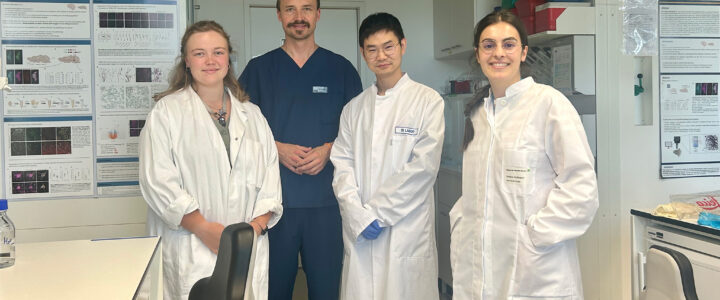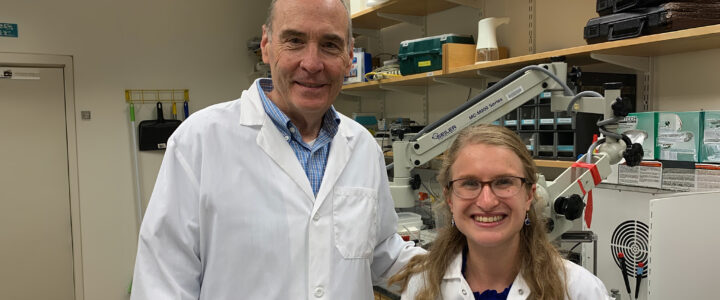Learn how Dr. Marine Anais Krzisch’s $35K FRAXA and ASF-funded project uses human iPSC microglia models to uncover pathways for Fragile X syndrome treatment.
Read moreAuthor: FRAXA Research Foundation
Modeling R-Loop Therapy for Fragile X Syndrome in Patient-Derived Brain Organoids

Fragile X syndrome researchers model R-loop therapy in patient-derived brain organoids to restore FMR1, accelerating a curative approach supported by FRAXA.
Read moreUMass Chan Medical School Licenses RNA-Based Therapy to QurAlis, Advancing a New Era in Fragile X Treatment

UMass Chan Medical School licenses RNA-based Fragile X treatment approach using ASOs to QurAlis, moving a groundbreaking gene-targeted therapy closer to human clinical trials.
Read moreHarvard’s Dr. Jeannie Lee Wins $1M Award to Develop Gene Reactivation Therapy for Fragile X

Dr. Jeannie Lee wins $1M Blavatnik Award to advance FMR1 gene reactivation therapy for Fragile X, building on years of FRAXA-funded research.
Read more#teamwally: Help Find a Cure for Fragile X Syndrome

Join #teamwally in supporting Fragile X research. Read Wally’s inspiring journey and help fund a future of hope and breakthroughs for kids like him.
Read moreNew Research Targets NMDA Receptor – A Key Player in Brain Communication and Fragile X Syndrome

Fragile X syndrome research identifies NMDA receptor as a promising treatment target, with drugs already in trials offering faster paths to human studies.
Read moreFragile X and Fatigue: Study Reveals How Muscle Function is Altered in Children

FRAXA-funded research shows how Fragile X syndrome muscle function affects walking and fatigue, offering insights for future treatments.
Read moreFragile X and PDE Inhibitors: A Promising Path Forward for Brain Disorders

Fragile X syndrome research shows PDE inhibitors may improve brain function and behavior, with promise for related neurodevelopmental disorders.
Read moreShionogi’s EXPERIENCE Phase 3 Clinical Trial of Zatolmilast in Fragile X Syndrome

Shionogi’s EXPERIENCE clinical trials for Fragile X syndrome are nearing completion. Enrollment for the adult trial (EXPERIENCE-301) is now closed, while the adolescent trial (EXPERIENCE-204) is in its final phase. Learn more about the study, FRAXA’s role, and the open-label extension.
Read moreUrgent Action Needed: Help Secure NIH Funding for Fragile X Research

NIH funding delays are threatening Fragile X research, putting critical studies and future treatments at risk. FRAXA Research Foundation and NFXF are urging Congress and the NIH to act now. Learn how you can help secure funding for Fragile X research.
Read moreAdvancing Curative Therapy for Fragile X Syndrome: Turner Lab Secures $1M Grant

Fragile X syndrome research accelerates as the Turner Lab secures $1M to expand FRAXA-funded work on curative therapy targeting the missing FMRP protein.
Read moreHelp Direct Millions in Fragile X Research Funding – DOD Seeks Reviewers

The DOD’s Fragile X syndrome research program seeks reviewers to help evaluate funding applications. No science background needed—apply by March 7!
Read moreGEXVal and FRAXA Collaborate to Advance Fragile X Research with Phase 2a Trial

GEXVal and FRAXA collaborate to advance Fragile X research with the Phase 2a trial of GXV-001, supported by AMED’s funding program.
Read moreHelp Rowan Thrive: Support Fragile X Research

Join the Gale family in supporting Fragile X research through FRAXA. Help Rowan and others thrive by funding life-changing treatments and advancing curative therapies.
Read moreHonor Cooper’s Birthday with a Donation to Fragile X Research

Honor Cooper’s birthday by donating to Fragile X syndrome research. Every contribution supports new treatments and hope for a brighter future.
Read moreSupport the FRAXA Schutz Family Campaign & #teamwally Campaign

Join the Schutz family in their journey with Fragile X syndrome. Discover Wally’s inspiring progress, the impact of clinical research, and how donations to FRAXA fuel hope for breakthroughs to support families affected by Fragile X.
Read moreDonate to the Clark Family Campaign

Join Stefanie Clark’s heartfelt appeal to support Fragile X research. Help fund breakthroughs for Lucas and others like him. Every dollar makes a difference — donate today!
Read moreSupport the Stevenson Family Campaign

The march of time renews the commitment we made to a special needs community 25 years ago. We vowed to dream big and never give up until there were effective treatments available and eventually a cure for Fragile X syndrome, the most commonly inherited cause of intellectual disabilities and autism.
Read moreBK Channel Openers: A New Hope for Fragile X Treatment – Insights from Kaerus Bioscience CEO Robert Ring

Kaerus Bioscience’s BK channel openers for Fragile X syndrome are advancing through Phase 1 trials, offering hope for new treatments with FRAXA’s continued support.
Read moreInvestigating the Role of the Insulin Degrading Enzyme (IDE) in Fragile X Syndrome

FRAXA Research Foundation awards a $100,000 grant to Ludwig Maximilian University researchers to investigate the role of insulin-degrading enzyme (IDE) in Fragile X syndrome, exploring new therapeutic approaches for cognitive and metabolic challenges in FXS.
Read moreNPR Spotlights Zatolmilast: A Potential Breakthrough for Fragile X Syndrome

NPR spotlights zatolmilast, a promising drug offering new hope for individuals with Fragile X syndrome. Families report life-changing improvements in anxiety, communication, and independence.
Read moreAltered Physiology of Primary Visual Cortex in Fragile X Syndrome

Discover how a $100,000 FRAXA grant supports research at MIT targeting neuron dysfunction in Fragile X, aiming to develop new therapies to improve sensory processing and behavior.
Read moreGene Editing of FMR1 to Correct FXS Phenotypes in Mice

FRAXA awarded a $100,000 grant to Dr. Davidson and Dr. Yrigollen at Children’s Hospital of Philadelphia to explore gene editing tools aimed at treating Fragile X syndrome by correcting FMR1 mutations in a unique mouse model.
Read moreFragile X Unplugged: Establishing Mobile EEG as the Next Frontier

Discover how a $100,000 FRAXA grant awarded to Cincinnati Children’s Hospital is advancing Fragile X research by simplifying EEG technology for home use, improving clinical trial accessibility and efficiency.
Read moreMarvel Biosciences Partners with FRAXA to Test MB204 for Fragile X Syndrome

Discover how Marvel Biosciences and FRAXA Research Foundation are collaborating to test MB204, a promising new treatment for Fragile X syndrome, building on groundbreaking adenosine receptor research.
Read more
